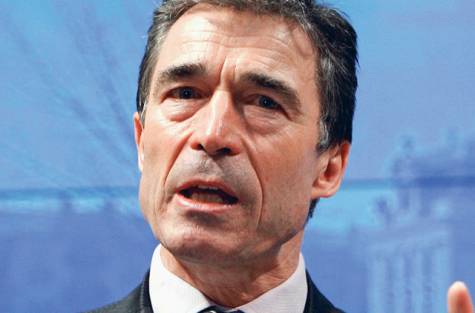
Necessary Step, Dangerous Rationalization: NATO Prolongs Libya Campaign
Publication: Eurasia Daily Monitor Volume: 8 Issue: 107
By:

On June 1 in Brussels, the North Atlantic Council approved a prolongation of the NATO-flagged campaign in Libya for another 90 days –that is, until the end of September (www.nato.int, June 1). The Alliance had originally set a 90-day term, counting from March 31 when launching this campaign; and it anticipated a quick successful conclusion to materialize well before the original deadline. The prolongation announced on June 1 comes 30 days before the expiry of the original 90-day term. It seems therefore that the net gain is of 60 days, rather than 90, for this operation.
Prolongation and escalation (as reportedly planned) are imperatively necessary in this unnecessary war, which must nevertheless, once initiated, be prosecuted to a successful outcome. Moreover, a Russian-mediated outcome (which Moscow actively seeks) would be widely perceived as a setback to NATO and the US, after months of bombing and other exertions.
In a flurry of accompanying statements on May 30-June 1, NATO’s Secretary-General, Anders Fogh Rasmussen, justified the prolongation largely with the same arguments he had used for justifying the launch of the campaign (“NATO and the Responsibility to Protect: Whom Exactly ?,” EDM, May 21). Rasmussen postulates a NATO humanitarian “responsibility to protect the Libyan people” from violence; and he insists that NATO could only act with approval from the UN Security Council (resolution No. 1973 of March 17 in this case). Moreover, the Secretary-General seems to hail the precedent-setting value of this mechanism, which would take NATO down the path of universal humanitarian interventions, if Rasmussen’s rationalization for the Libya mission is taken at face value.
This would constitute a major distraction from NATO’s core mission of protecting its own member countries and filling the security deficit in Europe’s East. “Responsibility-to-protect” interventionism would entail an unsustainable mission creep for NATO and its members at any time, all the more at this time of drastic cuts in defense budgets. And by presenting UN Security Council approval as indispensable, Rasmussen is using an argument that can only boomerang against NATO in future contingencies, in the form of Russian (or Chinese) vetoes.
Addressing NATO’s Parliamentary Assembly on May 30 in Varna, Rasmussen stated: “The UN Security Council Resolution 1973 is historic. It is the first ever Security Council Resolution calling upon the international community to take all necessary measures to protect civilians. In Libya, NATO is at the heart of a broad international effort to turn the UN concept of ‘Responsibility to Protect’ into reality. And we all have a moral responsibility to be ready to respond to similar calls from the United Nations in the future” (www.nato.int, May 30).
Addressing a Carnegie forum on June 1 in Brussels, NATO’s Secretary-General argued: “In a historic decision, the UN Security Council adopted Resolution 1973, authorizing all necessary measures to protect civilians. It is under this explicit mandate that NATO took overall command of military operations in Libya” (www.nato.int, June 1).
Reiterating the same argument in an op-ed piece, Rasmussen inadvertently highlighted the heavy constraints that “responsibility-to-protect” interventionism would place on NATO: “Some have asked why NATO acted in Libya but not elsewhere, particularly in Syria. My answer is clear: We took action in Libya because we have a strong mandate from the UN Security Council and solid support from [Arab] countries in the region….We will sustain our efforts to fulfill the United Nations mandate to protect the Libyan people” (International Herald Tribune, The New York Times, May 31, June 1).
In this presentation, NATO has no strategic objectives of its own. It looks, instead, as if duty-bound to take on a philanthropic mission, and accountable to a superordinate UN Security Council. There are indeed compelling reasons (including Russia’s veto power) as to why NATO cannot conceivably act in Syria. But the argument as presented can inadvertently foster doubts as to whether NATO would act on its own volition, without Russian (or Arab) approval, if allied interests so require.
Such rhetoric might make it difficult for NATO to justify future operations not approved by the UN and not necessarily humanitarian. It can also nudge the Alliance into more humanitarian interventions, diverting funds from shrinking defense budgets, ignoring challenges in NATO’s eastern neighborhood, and detracting from NATO’s preparedness for its core missions.
Importing the “responsibility-to-protect” doctrine into NATO would make short shrift of the Alliance’s Strategic Concept, only months after its adoption at NATO’s summit in November 2010. The Alliance has no responsibility to protect populations of the world against violence from their governments or from each other. NATO is only responsible for protecting its own member countries and the Alliance’s collective interests in its eastern and southern neighborhoods. Europe has some major interests in Libya (oil and gas supplies, migration control), but these have not been factored into the planning for this intervention. Referencing these interests could actually reinvigorate political support for bringing the campaign to a successful outcome, without resort to third-party brokers.




